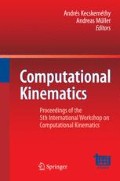Abstract
To enable optimization of the kinemetic calibration conditions of a robot to its task, we devised a method of estimating the output pose error after calibration and an error evaluation index. The index is based on the linearized relationship between the output pose error and measurement error. It depends on the kinematic parameters of the robot, calibration conditions and error evaluation conditions specified by the robot’s task. An experimental application to a parallelmechanism pipe bender was also undertaken.
Access this chapter
Tax calculation will be finalised at checkout
Purchases are for personal use only
Preview
Unable to display preview. Download preview PDF.
References
Driels, M., R. and Pathre, U., S., “Significance of observation strategy on the design of robot calibration experiments”, J. of Robotic Systems, Vol.7, No.2, 1990, pp.197-223.
Borm, J., H. and Menq, C., H., “Determination of optimal measurement configurations for robot calibration based on observability measure”, Int. J. Robotics Research, Vol. 10, No. 1, 1991, pp.51-63.
Toyama, S. and Hatae, S., “Identification and compensation of mechanical errors for a SCARA robot”, J. of JSPE, Vol. 58, No. 6, 1992, pp.999-1004.
Hollerbach, J., M. and Wampler, C., M., “The calibration index and taxonomy for robot kinematic calibration methods”, Int. J. Robotics Research, Vol. 15, 1996, pp.573-591.
Takeda, Y., Shen, G., and Funabashi, H., A DBB based kinematic calibration method for in-parallel actuated mechanisms using a Fourier series, Trans. ASME, J. of Mechanical Design, Vol. 126, 2004, pp.856-865.
Daney, D., Papegry, Y. and Madeline, B., “Choosing measurement poses for robot calibration with the local convergence method and tabu search”, Int. J. Robotics Research, Vol.24, No.6, 2005, pp.501-518.
Zhuang, H., “Self-calibration of parallel mechanisms with a case study on Stewart platforms”, IEEE Trans. Robotics and Automation, Vol. 13, pp. 387-397.
Iurascu, C.,C. and Park, F.,C., “Geometric algorithm for kinematic calibration of robots containing closed loops”, Trans. ASME, J. Mechanical Design, Vol. 125, pp. 23-32.
Author information
Authors and Affiliations
Editor information
Editors and Affiliations
Rights and permissions
Copyright information
© 2009 Springer-Verlag Berlin Heidelberg
About this paper
Cite this paper
Imoto, J., Takeda, Y., Saito, H., Ichiryu, K. (2009). Optimal Kinematic Calibration of Robots Based on Maximum Positioning-Error Estimation (Theory and Application to a Parallel-Mechanism Pipe Bender). In: Kecskeméthy, A., Müller, A. (eds) Computational Kinematics. Springer, Berlin, Heidelberg. https://doi.org/10.1007/978-3-642-01947-0_17
Download citation
DOI: https://doi.org/10.1007/978-3-642-01947-0_17
Publisher Name: Springer, Berlin, Heidelberg
Print ISBN: 978-3-642-01946-3
Online ISBN: 978-3-642-01947-0
eBook Packages: EngineeringEngineering (R0)

